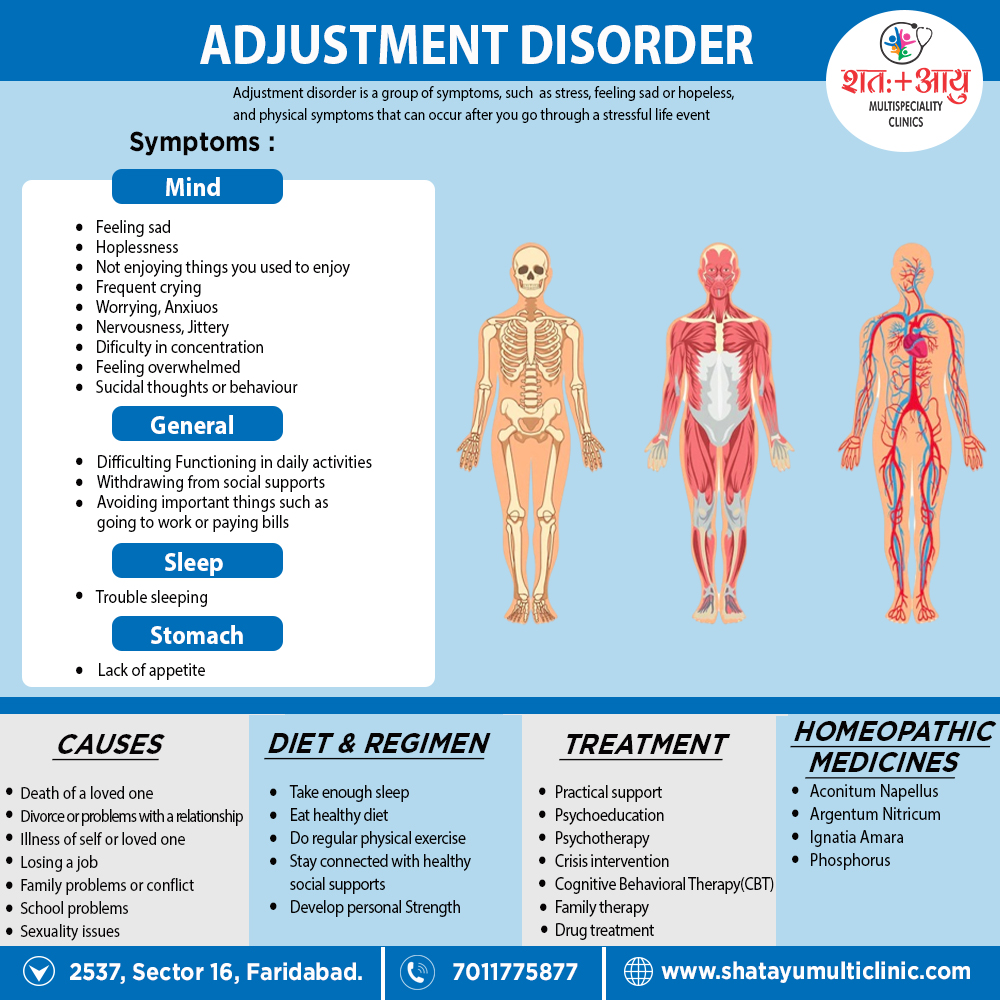Treatment
Many patients with an adjustment disorder do not need any formal treatment; they recover spontaneously with the help of friends and family.
General measures:
Practical support:
It is important to try to relieve any stress that is still ongoing; for example, by providing financial support, childcare, helping to arrange a funeral, or getting an occupational therapy assessment.
Psychoeducation:
Give the patient also their family information about adjustment disorders, and reassure them that it is not a serious psychiatric condition and that they are not going mad.
Information leaflets, support groups, also websites can all be valuable.
Anxiety reduction:
Anxiety reduction can usually be achieved by encouraging patients to talk about the problems and to express their feelings to a sympathetic listener.
Moving Further, A friend or family member can provide this, and many patients will not need any more formal therapeutic input.
Psychological treatments:
Self-help materials:
A good first step is to provide the patient with appropriate self-help materials, varied according to the predominant symptoms.
CBT-based and problem solving materials (for example; books, computerized courses) are particularly useful.
Brief psychotherapy or counselling:
Talking about the problems, understanding the meaning of the stressor to the patient, also addressing cognitive distortions are the mainstay of treatment.
This can be delivered by many different health professionals, also longer formal CBT is not usually necessary.
Options include:
- Either Individual or group psychotherapy,
- Crisis intervention,
- Family therapy,
- Specific counselling.
The most effective approach is problem solving, in which the patient is helped to:
- Firstly, List the problems and think of multiple ways of overcoming them;
- Secondly, Consider the advantages and disadvantages of various solutions to the problems;
- After that, Select an action and test it out;
- At last, Evaluate the action.
If the third step succeeds, the process is repeated with another problem; if it fails, the patient tries another approach to the first problem.
Crisis intervention:
This approach is used when a patient has responded to an acute life change such as the sudden breaking up of an intimate relationship with a maladaptive coping mechanism such as deliberate self-harm.
Many mental health trusts have a crisis intervention team, who will provide daily telephone (or home visit) support to patients whilst they are at high risk in order to reduce the need for hospital admission.
Pharmacological treatments:
Short-term anxiolytics:
- It may be necessary to provide a short-term supply (a few days) of an anxiolytic in the immediate aftermath of the stressful event.
- A low-dose relatively short-acting benzodiazepine is the best choice.
- They should not be continued longer term due to the risks of tolerance and dependence.
- Occasionally insomnia is a problem, and a few nights of a hypnotic (temazepam or a z-drug) are helpful.
Antidepressants:
- There is no good evidence that antidepressants are effective in relieving the symptoms of adjustment disorders.
- However, if there are prolonged/distressing mood or anxiety symptoms, a low-dose SSRI may provide some relief.
- Other antidepressants are not recommended as the risks outweigh the benefits. [5]

